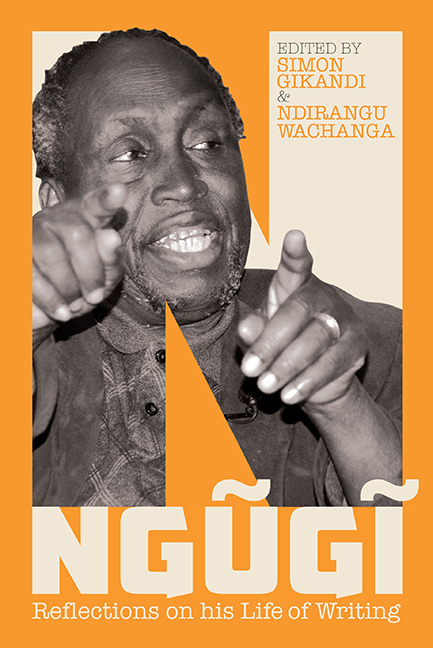Book contents
- Frontmatter
- Contents
- Preface
- Acknowledgements
- Chronology
- Photographic Section
- Introduction: Ngũgĩ wa Thiong'o: Reflections on His Life of Writing
- Ngũgĩ at Work
- Part I Serenades & Beginnings
- Part II Memories, Recollections & Tributes
- 10 Remembering Early Conversations with Ngũgĩ
- 11 Ngũgĩ wa Thiong'o at 80: Pongezi (Congratulations!)
- 12 Ngũgĩ wa Thiong'o at 80: Inspiring Encounters
- 13 Ngũgĩ in the 1970s at the University of Nairobi
- 14 ‘Professor, You are in Ngũgĩ's Book’
- 15 Mũraata, Mũrutani, na Mũthikĩrĩria (Friend, Teacher & Listener)
- 16 Fear & Trepidation in Asmara: Meeting Ngũgĩ
- 17 Ngũgĩ wa Thiong'o: A True Story
- 18 Ngũgĩ wa Thiong'o: Tribute on His 80th Birthday
- Part III Working with Ngũgĩ
- Part IV The Writer, the Critic & the World
- Part V The Other Ngũgĩ
- Appendixes
- References
- Bibliography of Ngũgĩ's Primary Works
- Works Cited
- Notes on Contributors
- Index
17 - Ngũgĩ wa Thiong'o: A True Story
from Part II - Memories, Recollections & Tributes
Published online by Cambridge University Press: 27 July 2019
- Frontmatter
- Contents
- Preface
- Acknowledgements
- Chronology
- Photographic Section
- Introduction: Ngũgĩ wa Thiong'o: Reflections on His Life of Writing
- Ngũgĩ at Work
- Part I Serenades & Beginnings
- Part II Memories, Recollections & Tributes
- 10 Remembering Early Conversations with Ngũgĩ
- 11 Ngũgĩ wa Thiong'o at 80: Pongezi (Congratulations!)
- 12 Ngũgĩ wa Thiong'o at 80: Inspiring Encounters
- 13 Ngũgĩ in the 1970s at the University of Nairobi
- 14 ‘Professor, You are in Ngũgĩ's Book’
- 15 Mũraata, Mũrutani, na Mũthikĩrĩria (Friend, Teacher & Listener)
- 16 Fear & Trepidation in Asmara: Meeting Ngũgĩ
- 17 Ngũgĩ wa Thiong'o: A True Story
- 18 Ngũgĩ wa Thiong'o: Tribute on His 80th Birthday
- Part III Working with Ngũgĩ
- Part IV The Writer, the Critic & the World
- Part V The Other Ngũgĩ
- Appendixes
- References
- Bibliography of Ngũgĩ's Primary Works
- Works Cited
- Notes on Contributors
- Index
Summary
This story, let us call it a ‘story’ only because I can think of no better term, has no proper beginning. Whether or not it has proper ending, well, that is a matter that has not yet been decided. Let us try for a beginning, then.
My colleague in the Program in Literature at Duke University, V. Y. Mudimbe, invited Ngũgĩ wa Thiong'o to present a series of lectures at our institution. On one of these afternoons, a couple of hours before he was scheduled to deliver his talk, I spotted Ngũgĩ on an East Campus bench, enjoying the warm Durham sunshine. I walked over to him, introduced myself, and proceeded to tell my story. He smiled, good naturedly; in his modesty, however, he scoffed at my account.
‘I'll bring you a book tomorrow,’ I said, ‘to show you that it's true.’ My promise of proof, in hindsight, is more like an ending – an ending of sorts, anyway – than a beginning.
So, let me try again.
It wasn't until I was in ‘Standard Nine’ (today it would be called ‘Eleventh Grade’ in South Africa, the equivalent of being a high school ‘Junior’ in the US) at Livingstone High School in Cape Town, a school designated for Coloureds only, that I first read any South African literature. Other, that is, than Alan Paton's Cry, the Beloved Country, which I'd picked off the shelves of my local library. Livingstone H.S., I should be clear, was a singular institutional animal in apartheid South Africa. The teachers, for the most part, were incredibly committed, no matter their race. Livingstone H.S. was a school that prided itself on educating its student body in two senses of the term: it taught the apartheid curriculum as rigorously as though us Coloured boys and girls were being instructed by Plato in Athens, no matter the discrepancy in resources, no matter the ideological strictures imposed by the apartheid regime's educational arm. (I should say, there were other schools such as Livingstone, Trafalgar and South Peninsula foremost among them. But Livingstone had one distinct advantage.) And, Livingstone's political and philosophical ethos was steeped in Marxist thought, most notably the work of Leon Trotsky.
- Type
- Chapter
- Information
- NgugiReflections on his Life of Writing, pp. 97 - 101Publisher: Boydell & BrewerPrint publication year: 2018



